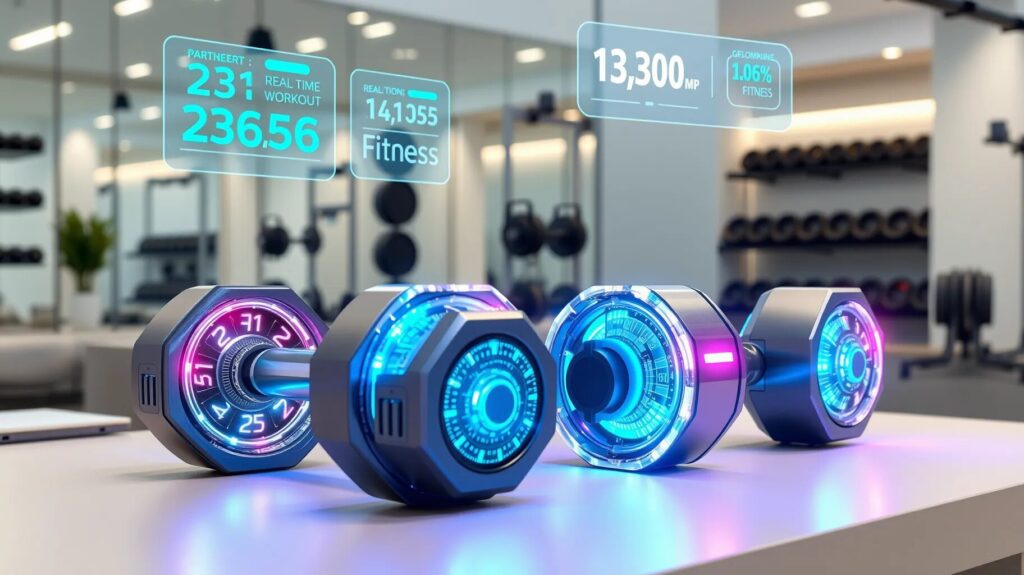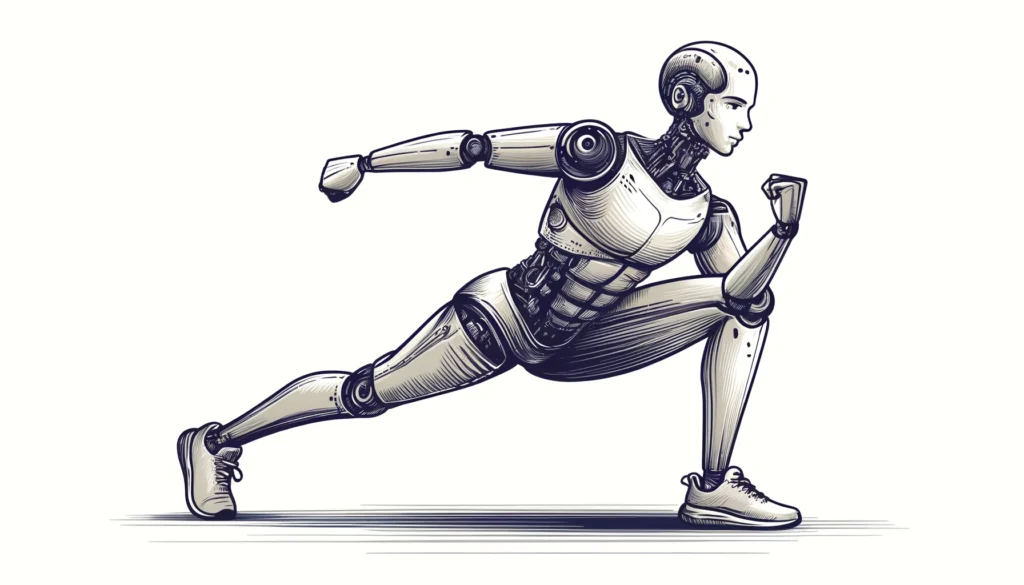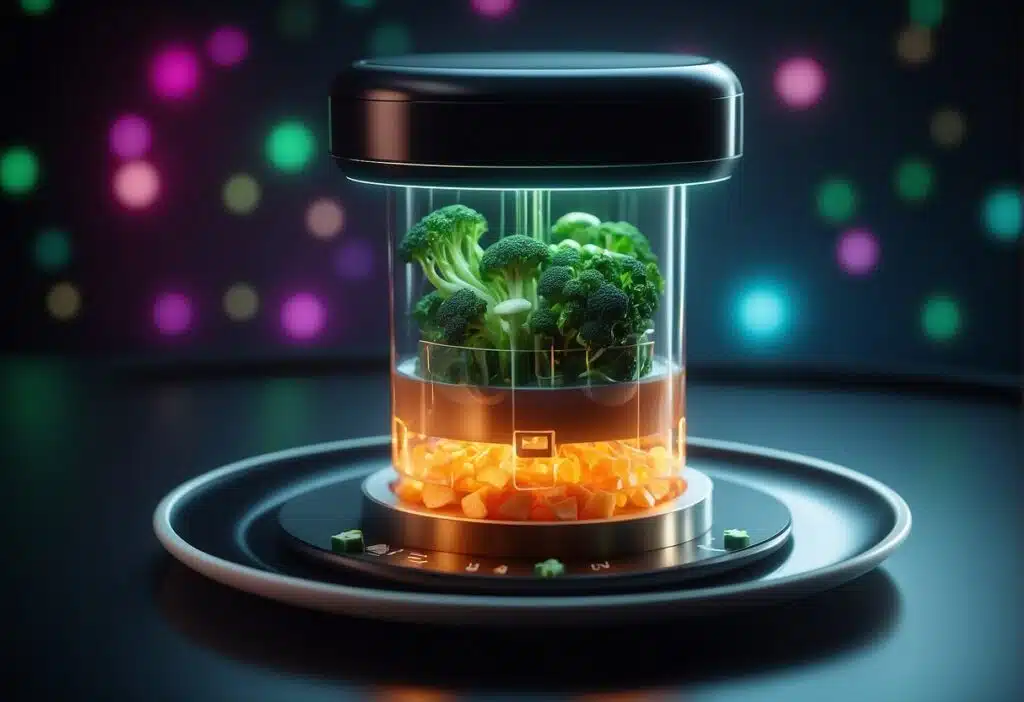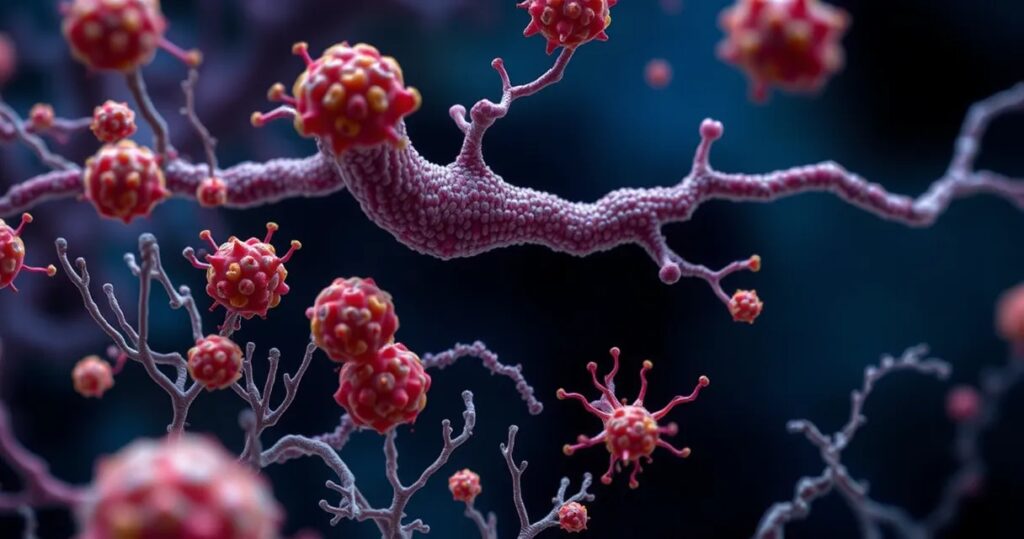
As health and technology merge, AI-driven microbiome research is rewriting the rules of nutrition. Understanding how bacteria in our guts interact with food could be the game-changer for personalized health.
Here’s how AI is making waves in microbiome science and its potential to reshape how we eat.
What is the Microbiome and Why It Matters
A Hidden World Inside Your Gut
Your gut microbiome is an ecosystem of trillions of microbes, including bacteria, fungi, and viruses. These tiny organisms play a big role in digestion, immunity, and even mental health.
When balanced, the microbiome keeps your body thriving. But an imbalance—too much harmful bacteria or not enough diversity—can lead to chronic diseases and inflammation.
Connection Between Food and Microbes
The foods you eat directly influence the composition of your gut microbiota. Fiber-rich foods fuel beneficial bacteria, while processed, sugary meals can encourage harmful microbes.
Think of the microbiome as a garden. What you “plant” determines whether your gut thrives or wilts.
How AI Unlocks the Microbiome’s Secrets
Big Data Meets Big Health
Microbiome research generates vast amounts of data. AI excels in sorting and analyzing this information, spotting patterns humans could miss.
For instance, AI algorithms can map the relationships between diet, gut bacteria, and health outcomes. This helps researchers predict how certain foods or supplements impact individual microbiomes.
Personalized Nutrition at Scale
AI enables nutritionists to craft hyper-personalized diet plans. Imagine knowing exactly which foods nurture your gut based on unique microbiome data.
Such insights could help manage conditions like irritable bowel syndrome, obesity, or even mood disorders.
Real-Time Gut Health Monitoring
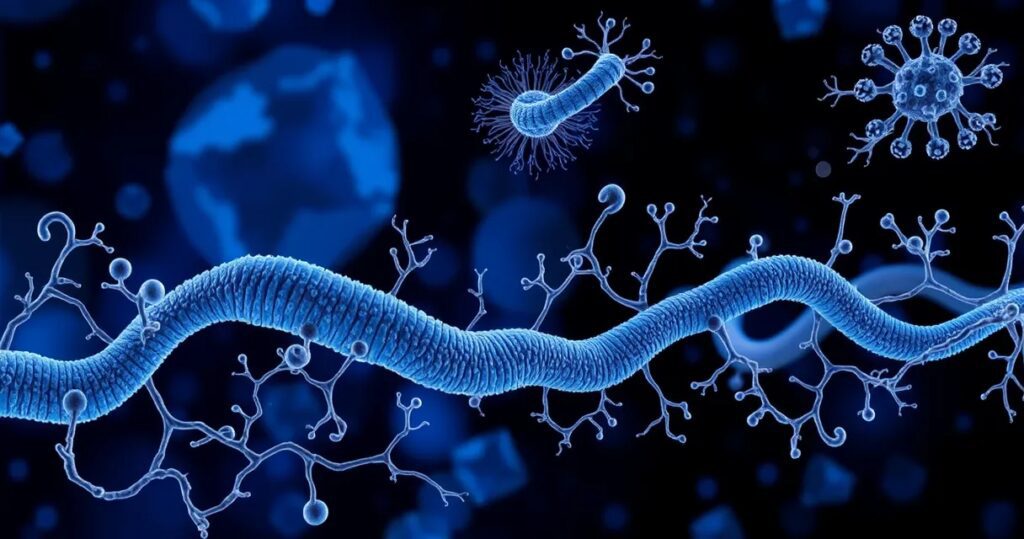
The Rise of Wearable Technology
New devices are integrating microbiome analysis with AI. These gadgets might soon provide real-time updates on your gut health.
For example, imagine wearing a device that detects shifts in your gut bacteria after eating a new meal. It could suggest better options to enhance digestion.
Continuous Gut Feedback
AI-driven apps now recommend probiotics, supplements, and dietary changes tailored to your needs. This instant feedback loop empowers users to take control of their health.
Revolutionizing Disease Prevention
Gut Health and Chronic Illness
The gut microbiome plays a critical role in conditions like diabetes, cardiovascular disease, and autoimmune disorders. AI can identify early warning signs by analyzing shifts in gut bacteria.
Early intervention—guided by AI—could prevent serious diseases by tweaking diet and lifestyle before problems arise.
Mental Health Connections
Emerging research links gut health to mental health. AI is helping decode how gut microbes produce neurotransmitters like serotonin.
This breakthrough could lead to nutrition-based therapies for anxiety, depression, and more.
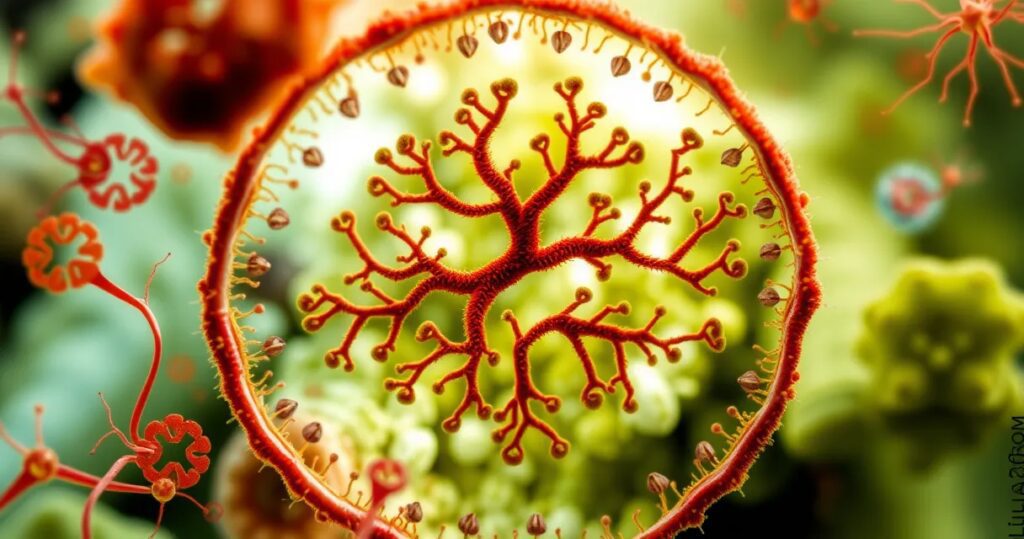
AI, Microbiome, and the Future of Food
Smarter Food Production
Food manufacturers are using AI to develop products that enhance gut health. From prebiotic snacks to microbiome-friendly meals, innovation is on the rise.
These foods won’t just taste good; they’ll actively promote better gut bacteria and overall wellness.
A Data-Driven Grocery Trip
AI-powered tools could soon help shoppers choose foods tailored to their microbiome profiles. Picture scanning a product with your phone to see if it suits your gut health goals.
Precision Medicine Powered by Gut Microbiome Data
Personalized Healthcare Tailored to Your Microbes
AI is revolutionizing precision medicine by analyzing individual microbiome data to guide treatments. From targeted antibiotics to customized probiotics, healthcare is becoming more individualized than ever.
Soon, doctors might use AI to prescribe dietary changes or supplements based on your microbiome composition, improving outcomes for chronic diseases and infections.
Revolutionizing Clinical Trials
AI-driven microbiome insights can optimize clinical trials for new treatments. By grouping patients based on gut composition, trials become more effective, leading to faster drug development.

AI and Microbiome-Driven Functional Foods
The Next Wave of Superfoods
AI is helping scientists create functional foods designed to enhance specific gut bacteria. These could include snacks rich in prebiotics, beverages packed with targeted probiotics, or meals optimized for gut diversity.
These foods won’t just nourish the body—they’ll actively promote long-term health by fostering a balanced microbiome.
Tailored Nutrition for Every Stage of Life
AI can identify how the microbiome evolves over time, allowing for age-specific dietary recommendations. Expect foods targeting children’s developing guts, tailored options for adults, and specialized solutions for aging populations.
Gut-Brain Axis: The Mental Health Revolution
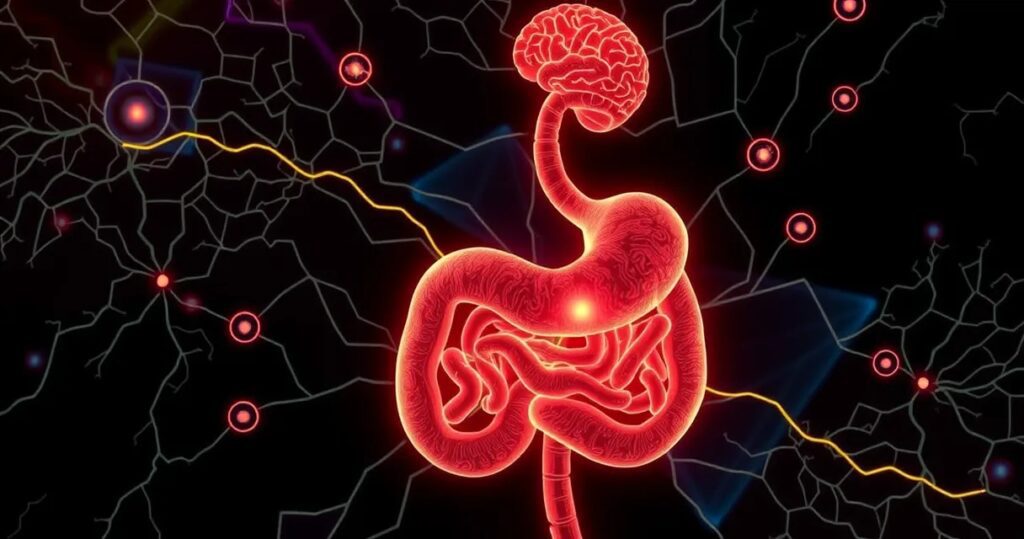
A Direct Line Between the Gut and the Brain
AI is uncovering how gut bacteria influence brain health. It’s the cornerstone of emerging treatments for mood disorders, cognitive decline, and stress.
For instance, scientists are exploring how certain diets boost gut bacteria that produce mood-enhancing neurotransmitters like serotonin.
The Role of AI in Behavioral Nutrition
AI-driven apps can recommend foods or supplements to improve mental clarity, reduce anxiety, and even manage symptoms of depression—all based on microbiome analysis.
The microbiome is the body’s hidden universe, and AI is the explorer.
— AI-C
Agriculture and AI-Enhanced Gut Health
Farming for Gut-Friendly Crops
AI and microbiome science are transforming agriculture. Farmers are now growing crops enriched with fibers and nutrients that nurture beneficial gut bacteria.
This focus on soil microbiomes, influenced by AI, ensures healthier plants, sustainable practices, and gut-boosting harvests.
Cleaner, Smarter Food Processing
AI also aids in reducing harmful microbial contamination during food processing. This ensures gut-safe products while maintaining essential nutrients for optimal microbiome health.
The Ethical and Privacy Concerns of AI in Microbiome Science
Who Owns Your Microbiome Data?
AI-powered microbiome services collect vast amounts of personal data. As this field grows, ensuring privacy and ethical use of this data becomes crucial.
Regulations must address how microbiome data is stored, shared, and used to avoid misuse by corporations or insurance companies.
Balancing Innovation and Accessibility
While AI-driven nutrition promises better health, ensuring accessibility across income levels is essential. This means keeping technology affordable and equitable for all.
A Future Shaped by AI and the Microbiome
The intersection of AI and microbiome science is reshaping how we think about food, health, and medicine. From precision nutrition and functional foods to groundbreaking mental health treatments, the possibilities are vast.
AI’s ability to analyze complex microbiome data is unlocking a new era of personalized health solutions, empowering individuals to make informed choices for their well-being. Meanwhile, its role in agriculture and food production is paving the way for a gut-health revolution, ensuring that future diets aren’t just nutritious but tailored to support a thriving microbiome.
However, this future comes with challenges. Privacy, ethical data use, and equitable access must be at the forefront of discussions as these innovations progress. If approached thoughtfully, AI-powered microbiome insights can usher in a healthier, more connected world.
The gut is no longer just a mystery—it’s a gateway to wellness, with AI leading the charge.
FAQs
Can AI improve mental health through gut health?
Emerging research supports the gut-brain connection, and AI is helping to deepen our understanding. Gut bacteria influence neurotransmitter production—like serotonin, which regulates mood.
For example, AI-driven dietary recommendations might suggest foods like bananas (rich in serotonin precursors) or probiotics to boost Lactobacillus levels, potentially easing symptoms of anxiety or depression.
Is microbiome analysis safe and private?
Microbiome analysis itself is safe, involving non-invasive stool tests. However, privacy is a valid concern. Many companies store and analyze microbiome data for research purposes.
To protect yourself, choose services that are transparent about data usage. Look for providers that let you opt out of data sharing and ensure that any analysis is anonymized.
How does AI analyze microbiome data?
AI uses machine learning algorithms to process vast amounts of microbiome data, identifying patterns and connections between gut bacteria, diet, and health outcomes.
For instance, AI can examine your microbiome composition and flag imbalances, such as low diversity or harmful bacteria overgrowth. It then cross-references this data with clinical studies to suggest foods, probiotics, or lifestyle changes tailored to restore balance.
Can AI predict health risks from the microbiome?
Absolutely. AI can detect subtle changes in your microbiome that might signal early health risks, such as inflammation or metabolic disorders.
For example, a reduction in Akkermansia muciniphila, a bacterium linked to gut lining health, could signal an increased risk of type 2 diabetes. AI might recommend dietary interventions, like increasing fiber intake, to address the issue early.
Are wearable devices for gut health really effective?
Wearable devices for gut health are still in their early stages, but they show promise. These tools monitor biomarkers, such as breath hydrogen or intestinal gas, to assess gut health in real time.
For example, some devices use AI to analyze these biomarkers and provide actionable insights, such as suggesting foods to improve digestion or reduce bloating after a meal. While they’re not a replacement for in-depth microbiome testing, they offer a convenient way to track trends.
How are AI and microbiomes shaping the food industry?
AI is transforming food development by identifying ingredients that support gut health. It helps food companies formulate products with enhanced levels of prebiotics, probiotics, or postbiotics.
For instance, AI might suggest adding resistant starch to baked goods, making them gut-friendly without compromising taste. It also streamlines processes like fermentation to improve product consistency and health benefits.
Can microbiome-based interventions help with weight management?
Yes, the microbiome plays a significant role in weight regulation, and AI is uncovering how to optimize it for weight management.
For example, certain gut bacteria, like Firmicutes and Bacteroidetes, are linked to energy extraction from food. AI can analyze your microbial ratios and recommend dietary tweaks to promote beneficial bacteria, supporting healthier weight loss or maintenance.
How do I know if my microbiome is imbalanced?
Signs of an imbalanced microbiome include digestive issues (bloating, diarrhea, constipation), frequent infections, skin problems, and even mood swings.
Microbiome testing, often guided by AI, can confirm imbalances by analyzing the diversity and composition of your gut bacteria. Based on the results, AI can recommend solutions like probiotics or dietary adjustments.
Is AI in microbiome research accessible to everyone?
Currently, AI-driven microbiome analysis is more accessible than ever, but affordability remains a concern. Home testing kits, which use AI to deliver insights, are widely available, but costs range from $100 to $400.
Efforts are underway to make these technologies more affordable and to integrate microbiome analysis into public health initiatives. For now, options like basic dietary adjustments based on general gut health principles can provide benefits without breaking the bank.
What role does AI play in preventing chronic diseases?
AI is invaluable for early detection and prevention. By analyzing shifts in gut bacteria, it can identify early indicators of diseases like diabetes, heart disease, and autoimmune disorders.
For example, AI might flag an increase in pro-inflammatory bacteria, such as Enterobacteriaceae, and recommend anti-inflammatory foods like leafy greens or omega-3-rich fish to mitigate risks.
Can AI help treat food intolerances and allergies?
Yes, AI is making breakthroughs in addressing food-related issues by analyzing microbiome patterns. Food intolerances, such as lactose or gluten intolerance, often stem from imbalances in gut bacteria.
For example, if your microbiome lacks Lactobacillus, which helps digest lactose, AI might recommend incorporating fermented foods like yogurt to ease symptoms. It’s a precise way to address intolerances without cutting out entire food groups unnecessarily.
What is the difference between prebiotics, probiotics, and postbiotics?
- Prebiotics: Non-digestible fibers that feed beneficial gut bacteria. Examples include garlic, onions, and bananas.
- Probiotics: Live beneficial bacteria found in foods like yogurt, kimchi, and supplements.
- Postbiotics: Bioactive compounds produced when probiotics digest prebiotics. These include short-chain fatty acids that support gut and overall health.
AI uses microbiome data to identify which combination of these would benefit an individual. For example, if your gut produces low postbiotics, AI could recommend prebiotic-rich foods to stimulate production.
Can gut health influence athletic performance?
Yes, gut health significantly affects energy levels, recovery, and endurance. AI is helping athletes optimize their microbiome to perform better.
For instance, studies show that the bacterium Veillonella breaks down lactic acid, improving endurance. AI can identify if your microbiome lacks this bacteria and suggest strategies, like specific prebiotics, to boost its presence.
Are there risks to AI-driven microbiome interventions?
While AI-driven microbiome insights are promising, they’re not without risks. Recommendations based on incomplete or inaccurate microbiome data could lead to overuse of probiotics or unnecessary dietary restrictions.
To minimize risks, work with reputable services and consult healthcare providers when integrating microbiome-based interventions. AI is a tool to enhance—not replace—professional medical advice.
How does stress affect the microbiome, and can AI help?
Chronic stress disrupts the balance of gut bacteria, reducing beneficial strains and increasing harmful ones. This imbalance can lead to digestive issues and inflammation.
AI tools can track stress-related changes in the microbiome and recommend interventions. For example, if stress decreases levels of Lactobacillus, AI might suggest probiotics or stress-reducing activities like meditation alongside dietary changes.
Can children benefit from AI and microbiome insights?
Absolutely. A child’s microbiome plays a crucial role in their growth, immunity, and brain development. AI can guide parents in choosing foods or supplements that support a child’s microbiome.
For example, if a child has low gut bacterial diversity, AI might recommend fermented foods like kefir or age-appropriate prebiotic supplements to promote a thriving gut environment.
Are AI-driven microbiome insights useful for seniors?
Yes, seniors often experience reduced microbiome diversity, which can weaken immunity and digestion. AI can help identify these changes and recommend solutions.
For example, AI might suggest foods high in resistant starch (like cooked and cooled potatoes) to promote beneficial bacteria like Bifidobacterium, improving gut health and reducing inflammation in older adults.
How are AI and microbiome science influencing the beauty industry?
AI-powered microbiome research is making waves in skincare and cosmetics. The skin has its own microbiome, which influences conditions like acne, eczema, and aging.
AI analyzes skin microbiome data to develop tailored skincare products. For instance, creams containing probiotics can balance skin bacteria, while AI tools can recommend specific products based on individual microbiome profiles for glowing, healthy skin.
What’s the future of AI and microbiome research?
The future includes real-time microbiome monitoring, personalized food production, and even microbiome-based therapies for diseases like cancer or Alzheimer’s. AI will also make these innovations faster, more accessible, and more precise.
For instance, scientists are exploring how AI can harness microbiome data to design cancer treatments that enhance immune responses. Expect rapid advancements in every aspect of healthcare, driven by this synergy of AI and microbiome science.
Resources
Scientific Publications and Journals
- Nature Microbiology: Covers groundbreaking research on microbiomes, including AI-driven insights.
Visit here - Gut Microbes Journal: Focuses on the gut microbiome’s role in health and disease.
- Frontiers in Microbiology: Offers open-access studies on microbiomes and innovative technologies like AI.
Organizations and Research Groups
- The Human Microbiome Project (HMP): A comprehensive initiative exploring the human microbiome’s role in health.
Learn more here - AI for Good (UN): Explores how AI contributes to health innovations, including microbiome research.
- American Gut Project: A citizen science effort studying the microbiome with accessible educational content.
Participate or explore
Books for Deeper Insights
- The Mind-Gut Connection by Dr. Emeran Mayer: Explores the gut-brain axis and its impact on mental health.
- I Contain Multitudes by Ed Yong: An engaging introduction to microbiome science.
- Artificial Intelligence in Healthcare by Arjun Panesar: Covers AI’s transformative role in health, including microbiome insights.
Online Courses and Learning Platforms
- Coursera: Offers courses on microbiome science and AI applications in health, such as:
- Gut Check: Exploring Your Microbiome by the University of Colorado.
- AI for Everyone by Andrew Ng for foundational AI knowledge.
Start learning
- EdX: Hosts microbiome-related courses like Introduction to the Microbiome by the University of Maryland.
Explore here
Tools and Platforms for Personal Microbiome Analysis
- Viome: Uses AI to provide personalized nutrition based on microbiome data.
Check it out - uBiome (archived): A now-defunct but influential company in citizen microbiome science—review their legacy for insights.
- Thryve (Now Ombre): Offers microbiome testing and personalized probiotic recommendations.
Visit Ombre
Community Forums and Blogs
- The Microbiome Digest: A daily newsletter and blog summarizing new research in the microbiome field.
Subscribe here - AI in Healthcare Forums: Engage with communities on platforms like Reddit’s r/MachineLearning or r/Microbiome.
Join the discussion
